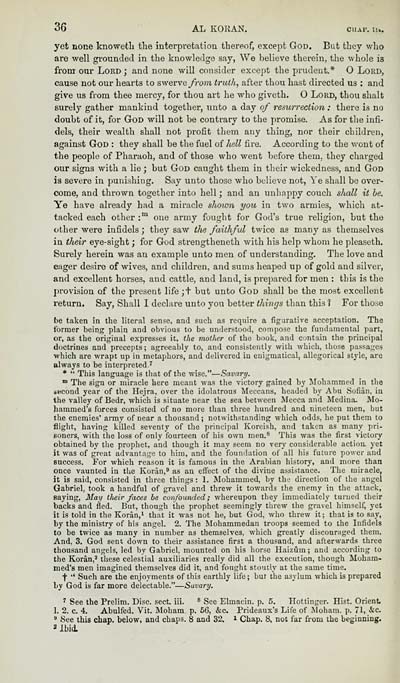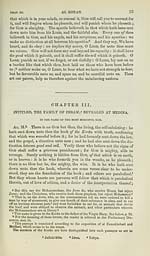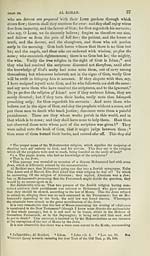Download files
Complete book:
Individual page:
Thumbnail gallery: Grid view | List view

36 AL KORAN. ciiAP. ii».
yet none knowetli the interpretation thereof, except God. But they who
are well grounded in the knowledge say, We believe therein, the whole is
from onr Lord ; and none will consider except the i^rudeut.* O Lord,
cause not our hearts to swerve yj-o?^ truth, after thou hast directed us : and
give us from thee mercy, for thou art he who giveth. O Lord, thou shalt
surely gather mankind together, unto a day of resurrection : there is no
doubt of it, for GoD will not be contrary to the promise. As for the infi-
dels, their wealth shall not profit tliem any thing, nor their children,
against God : they shall be the fuel of hell fire. According to the wont of
the people of Pharaoh, and of those who went before them, they charged
our signs with a lie ; but God caught them in their wickedness, and God
is severe in punishing. Say unto those who believe not, Ye shall be over-
come, and thrown together into hell ; and an unhappy couch shcdl it be.
Ye have already had a miracle shoum you in two armies, which at-
tacked each other :°^ one army fought for God's true religion, but the
other were infidels ; they saw the faithful twice as many as themselves
in their eye-sight ; for God sti-engtheneth with his help whom he pleaseth.
Surely herein was an example unto men of understanding. The love and
eager desire of wives, and children, and sums heaped up of gold and silver,
and excellent horses, and cattle, and land, is prepared for men : this is the
provision of the present Iife;t but unto God shall be the most excellent
return. Say, Shall I declare unto you better things than this 1 For those
be taken in the literal sense, and such as require a figurative acceptation. The
former being plain and obvious to be understood, compose the fundamental part,
or, as the original expresses it, the mother of the book, and C(mtain the principal
doctrines and precepts ; agreeably to, and consistently with which, those passages
which are wrapt up in metaphoi-s, and delivered in enigmatical, allegorical style, are
always to be interpreted.^
* " This language is that of the wise." — Savary.
" The sign or miracle here meant was the victory gained by Mohammed in the
*ticond year of the Hejra, over the idolatrous Meccans, headed by Abu Sofian, in
the valley of Bedr, which is situate near the sea between Mecca and Medina. Mo-
hammed's forces consisted of no more than three hundred and nineteen men, but
the enemies' army of near a thousand ; notwithstanding which odds, he put them to
flight, having killed seventy of the principal Koreish, and taken as many pri-
soners, with the loss of only fourteen of his own men.^ This was the first victory
obtained by the prophet, and though it may seem no very considerable actioa yet
it was of great advantage to him, and the "foundation of all his future power and
success. For which reason it is famous in the Arabian history, and more than
once vaunted in the Koran,» as an effect of the divine assistance. The miracle,
it is said, consisted in three things : 1. Mohammed, by the direction of the angel
Gabriel, took a handful of gravel and threw it towards the enemy in the attack,
Baying, Marj their faces he confounded; whereupon they immediately turned their
backs and fled. But, though the prophet seemingly threw the gravel himself, yet
it is told in the Koran,i that it was not he, but God, who threw it; that is to say,
by the ministry of his angel. 2. The Mohammedan troops seemed to the Infidels
to be twice as many in number as themselves, which greatly discouraged them.
And, 3. God sent down to their assistance first a thousand, and afterwards three
thousand angels, led by Gabriel, mounted on his horse Haizum ; and according to
the Koran,' these celestial auxiliaries really did all the execution, though Moham-
med's men imagined themselves did it, and fought stoutly at the same time.
t '' Such are the enjoyments of this earthly life; but the asylum which is prepared
by God is far more delectable." — Savary.
^ See the Prelim. Disc. sect. iii. ^ See Elmacin. p. 5. Hottingcr. Hist. Orient.
1. 2. c. 4. Abulfed. Vit. Moham p. 56, &c. Prideaux's Life of Moham. p. 71, &c.
* See this chap, below, and chaps. 8 and 32. i Chap. 8, not far from the beginning,
a ibid.
yet none knowetli the interpretation thereof, except God. But they who
are well grounded in the knowledge say, We believe therein, the whole is
from onr Lord ; and none will consider except the i^rudeut.* O Lord,
cause not our hearts to swerve yj-o?^ truth, after thou hast directed us : and
give us from thee mercy, for thou art he who giveth. O Lord, thou shalt
surely gather mankind together, unto a day of resurrection : there is no
doubt of it, for GoD will not be contrary to the promise. As for the infi-
dels, their wealth shall not profit tliem any thing, nor their children,
against God : they shall be the fuel of hell fire. According to the wont of
the people of Pharaoh, and of those who went before them, they charged
our signs with a lie ; but God caught them in their wickedness, and God
is severe in punishing. Say unto those who believe not, Ye shall be over-
come, and thrown together into hell ; and an unhappy couch shcdl it be.
Ye have already had a miracle shoum you in two armies, which at-
tacked each other :°^ one army fought for God's true religion, but the
other were infidels ; they saw the faithful twice as many as themselves
in their eye-sight ; for God sti-engtheneth with his help whom he pleaseth.
Surely herein was an example unto men of understanding. The love and
eager desire of wives, and children, and sums heaped up of gold and silver,
and excellent horses, and cattle, and land, is prepared for men : this is the
provision of the present Iife;t but unto God shall be the most excellent
return. Say, Shall I declare unto you better things than this 1 For those
be taken in the literal sense, and such as require a figurative acceptation. The
former being plain and obvious to be understood, compose the fundamental part,
or, as the original expresses it, the mother of the book, and C(mtain the principal
doctrines and precepts ; agreeably to, and consistently with which, those passages
which are wrapt up in metaphoi-s, and delivered in enigmatical, allegorical style, are
always to be interpreted.^
* " This language is that of the wise." — Savary.
" The sign or miracle here meant was the victory gained by Mohammed in the
*ticond year of the Hejra, over the idolatrous Meccans, headed by Abu Sofian, in
the valley of Bedr, which is situate near the sea between Mecca and Medina. Mo-
hammed's forces consisted of no more than three hundred and nineteen men, but
the enemies' army of near a thousand ; notwithstanding which odds, he put them to
flight, having killed seventy of the principal Koreish, and taken as many pri-
soners, with the loss of only fourteen of his own men.^ This was the first victory
obtained by the prophet, and though it may seem no very considerable actioa yet
it was of great advantage to him, and the "foundation of all his future power and
success. For which reason it is famous in the Arabian history, and more than
once vaunted in the Koran,» as an effect of the divine assistance. The miracle,
it is said, consisted in three things : 1. Mohammed, by the direction of the angel
Gabriel, took a handful of gravel and threw it towards the enemy in the attack,
Baying, Marj their faces he confounded; whereupon they immediately turned their
backs and fled. But, though the prophet seemingly threw the gravel himself, yet
it is told in the Koran,i that it was not he, but God, who threw it; that is to say,
by the ministry of his angel. 2. The Mohammedan troops seemed to the Infidels
to be twice as many in number as themselves, which greatly discouraged them.
And, 3. God sent down to their assistance first a thousand, and afterwards three
thousand angels, led by Gabriel, mounted on his horse Haizum ; and according to
the Koran,' these celestial auxiliaries really did all the execution, though Moham-
med's men imagined themselves did it, and fought stoutly at the same time.
t '' Such are the enjoyments of this earthly life; but the asylum which is prepared
by God is far more delectable." — Savary.
^ See the Prelim. Disc. sect. iii. ^ See Elmacin. p. 5. Hottingcr. Hist. Orient.
1. 2. c. 4. Abulfed. Vit. Moham p. 56, &c. Prideaux's Life of Moham. p. 71, &c.
* See this chap, below, and chaps. 8 and 32. i Chap. 8, not far from the beginning,
a ibid.
Set display mode to: Large image | Transcription
Images and transcriptions on this page, including medium image downloads, may be used under the Creative Commons Attribution 4.0 International Licence unless otherwise stated. ![]()
| Early Gaelic Book Collections > J. F. Campbell Collection > Koran: or, Alcoran of Mohammed > (190) |
|---|
| Permanent URL | https://digital.nls.uk/77136185 |
|---|
| Description | Volumes from a collection of 610 books rich in Highland folklore, Ossianic literature and other Celtic subjects. Many of the books annotated by John Francis Campbell of Islay, who assembled the collection. |
|---|
| Description | Selected items from five 'Special and Named Printed Collections'. Includes books in Gaelic and other Celtic languages, works about the Gaels, their languages, literature, culture and history. |
|---|

